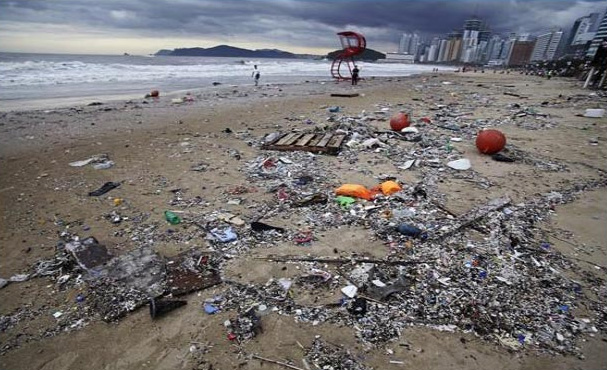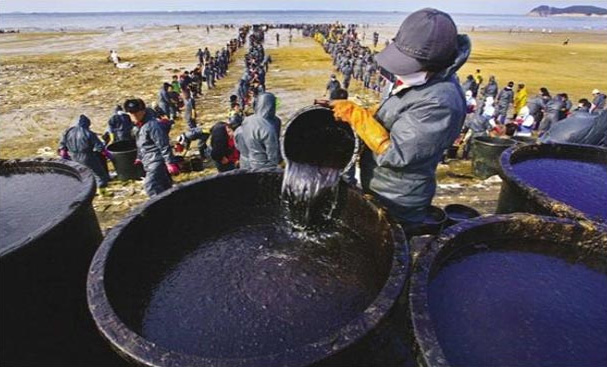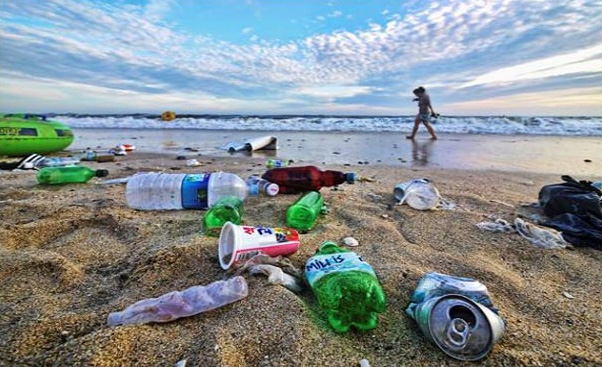
The Earth’s atmosphere is the reason the average temperature on the planet is about 15℃. If there were no atmosphere on Earth, the average surface temperature would fall to minus 18℃, and the entire planet would be covered in ice. Working effectively as a greenhouse, the Earth’s atmosphere depends on the greenhouse gases of carbon dioxide, vapor, methane, ozone, and nitric oxide to maintain a hospitable temperature for life.
Among them, the impact of each gas on the greenhouse effect differs. Vapor and carbon dioxide play a significant role accounting for approximately 67% and 25% of the effect, respectively. Therefore, if the level of greenhouse gases such as carbon dioxide increases, the average temperature on Earth would correspondingly rise.

The global population, which stood at only about a few hundred million just 500 years ago, reached about 5 billion in 1987, 6 billion in 1999, and over 7 billion in 2011. This explosive increase in population has led to heavy consumption of energy, particularly fossil fuels such as gas and coal. As a result, carbon dioxide concentration in our atmosphere has increased, driving up global temperatures.
There are two reasons behind the rising sea level as a result of global warming: the expansion of sea water (51-53%) due to warmer water led by rising global temperature, and the influx of water from melting ice bergs (48-50%). Icebergs that are flaoting on the ocean do not increase the level of sea water even when they melt. The sea level has fluctuated consistently from the past in accordance with the climate. About 120,000 years ago, in the mild inter-glacial period, the sea level was about 5 to 6m higher than it is today. On the other hand, during the last ice age about 18,000 years ago, the sea level was about 100m below current levels.
Global warming has expanded the sea area where the temperature is higher than 28℃. Accordingly, the area where storms take place has also increased. This has led to more frequent storms with higher intensity. When the sea temperature rises by 1℃, the frequency of storms is expected by about 40%.
When the sea level rises, human activity along coastal regions will become constrained, and the number of marine species inhabiting the coasts will fall. Furthermore, deltas located at the downstream of a river are where economic activity including agriculture is active. Because the population density there is high, flooding or saltwater intrusion from rising sea level will likely have a significant impact socially and economically.
The Kyoto Protocol was officially adopted on February 16h 2005 under the UNFCCC held in Kyoto, Japan in December 1997. 38 developed country parties committed to reducing 5.2% of greenhouse gas emissions on average by 2008-2012 from 1990 levels.
Korea ratified the protocol in November 2002. While it is not legally obligated, as a member of the OECD it is under pressure to reduce greenhouse gas emissions. There is a high likelihood that Korea would be included in a second group of countries that will commit to greenhouse gas reduction by 2013-2017.
There are 6 types of gases that are targets for reduction due to their impact on global warming: CO2, CH4, N2O, PFC, HFC, and SF6.
On December 7th 2007, an oil tanker crashed into a rock off the coast of Taean, South Chungcheong Province, Korea, and spilled a large amount of oil into the sea. The amount of oil spilled was twice as much as the Sea Prince accident in 1995. As a result of this accident, Cheonsu Bay, which is a habitat for migratory birds on the western coast, was heavily contaminated. The ecosystem was destroyed, causing damage to the local fishing community. In response, Koreans from around the country flocked to the region to help control the oil spill. The full recovery of the ecosystem in Taean is expected to take 20 years.

Besides oil spill accidents, sea pollution is also caused by waste swept away or disposed in the ocean. The amount of land waste disposed at sea increased 8.3 fold from 1.06 million tons in 1990 to 8.07 million tons in 2003. From 1988 to 2010, the level reached 125 million ㎥, which amounts to 239 times the volume of the 63 Building and 52 times the Sangam World Cup Station. As a result, 810㎢ of mudflats, equivalent to 1.3 times the area of Seoul, have disappeared from the Korean peninsula over the past 10 years.
The global community expects the 21st century to be an era of marine civilization and is showing greater interest in the seas. However, excessive development, resource abuse, and sea contamination are greater than ever before. According to the data by the Food and Agriculture Organization (FAO) IN 2002, 10% of fish species are now extinct, 18% are decreasing due to over-fishing, and 46% cannot be caught by any larger amount due to maximized use.
Thankfully, the global community established international law of seas in the late 20th century and has been making efforts to preserve the seas and their environment. The UNCLOS (international laws on seas adopted in Geneva on December 10th 1982), Rio Declaration (declaration containing general principles of the Rio Summit that aims for coexistence of nature and people, as well as environment preservation and development), Agenda 21 (Action Plan adopted at the UN Conference on Environment and Development in Rio de Janeiro, Brazil in 1992), and the Implementation Plan for the Protection of Marine Environment of the WSSD (Global Summit and the G8 Summit on sustainable development in Johannesburg, South Africa) are the result of such efforts.
Korea decided to prohibit the disposal of sewage sludge (semi-solid material produced as a by-product during sewage treatment) and livestock excretions from 2012, and food waste from 2013 in line with the enforcement decree of marine environment management enacted in December 29th 2011. This was initiated as an effort to exonerate Korea from the dishonor of being the only country among parties to the London Protocol that disposes sewage sludge in the seas. It confirmed the prohibition plan of contaminants set by comprehensive measures on dumping of land waste into oceans, which was adopted in agreement among relevant ministries such as the Ministry of Land, Transport and Maritime Affairs, the Ministry of Environment, and the Ministry of Agriculture, Forestry and Fisheries in March 2006.

The 1996 London Protocol is an international commitment to prevent marine pollution by dumping of land wastes and other matters. Land waste including domestic sewage, agricultural wastewater, oil spill, heavy metals and toxic substance, have severely contaminated the sea.
Excessive supply of nutriments has removed oxygen from mudflats and wetland sediments, which enables contaminants to sink in more easily, and leads to death of many marine species. In response, the 1996 London Protocol was established to ensure that land waste is disposed on land and only the minimal amount is disposed of into the sea.
Korea joined the London Convention in 1993 and adopted the 1996 Protocol to help preserve marine environment.
In 1958, the agreement on international laws regarding seas such as territorial sea and contiguous zones, high seas, fishing and conservation of living resources of the high seas, and continental shelves were legalized.
The 1972 declaration containing basic principles on environment and development under the slogan, “Healthy Earth and Rich Future”
※ The texts were written based on the outcome of “Development of Ocean Education Textbook” and “Development of Contents for Ocean Education Textbook” projects conducted by the Korea Maritime Foundation in 2010 and 2011.